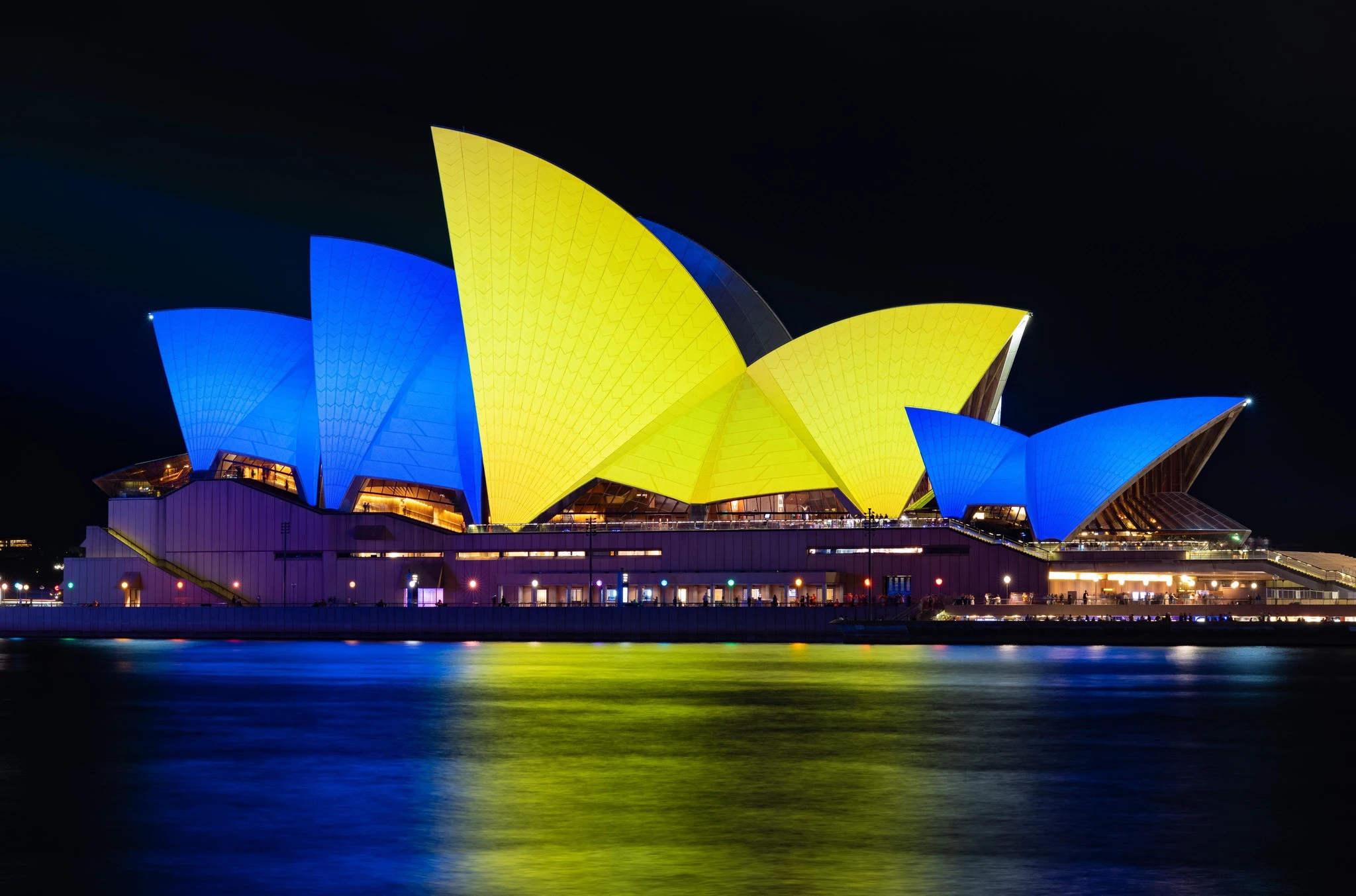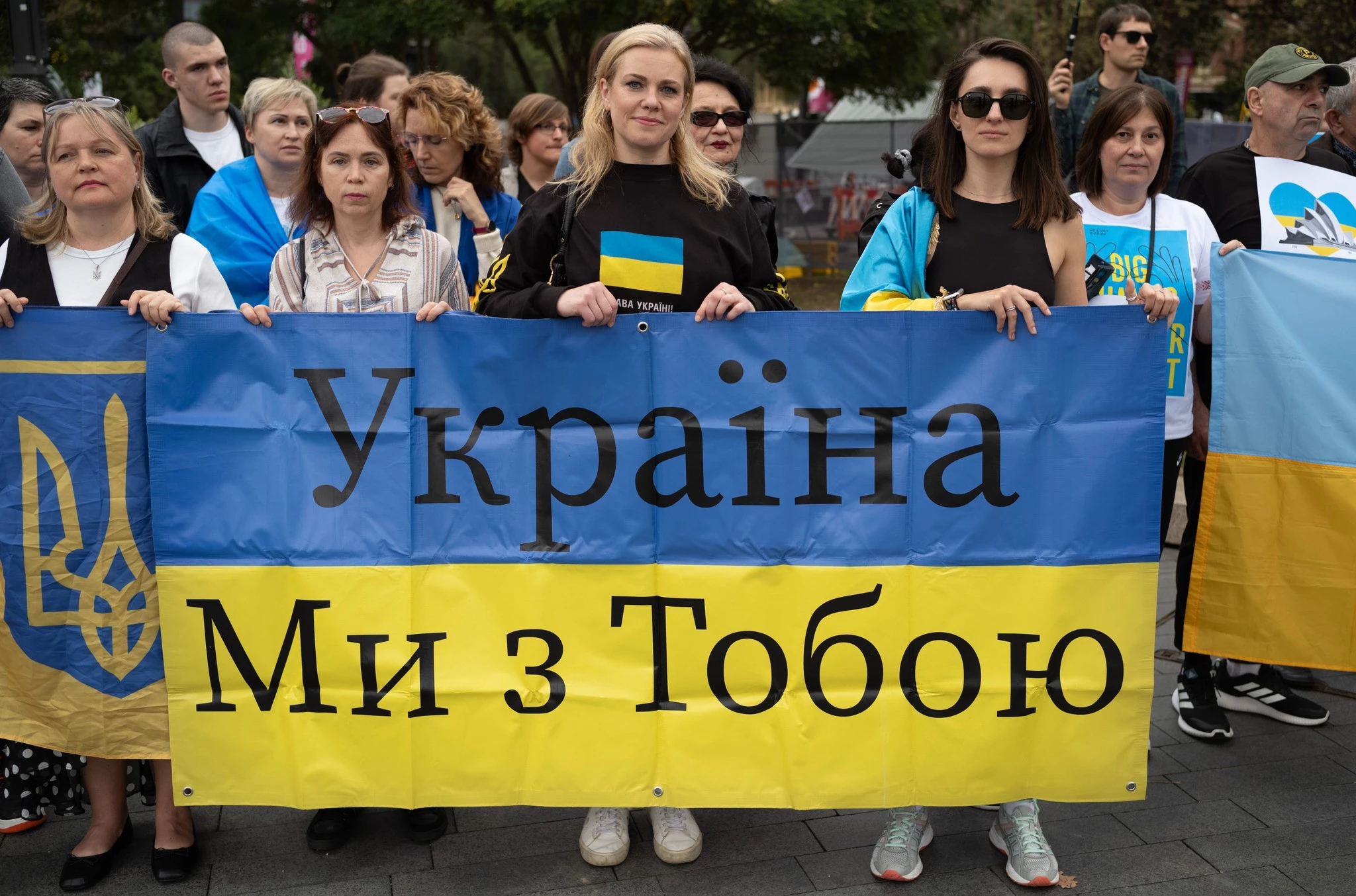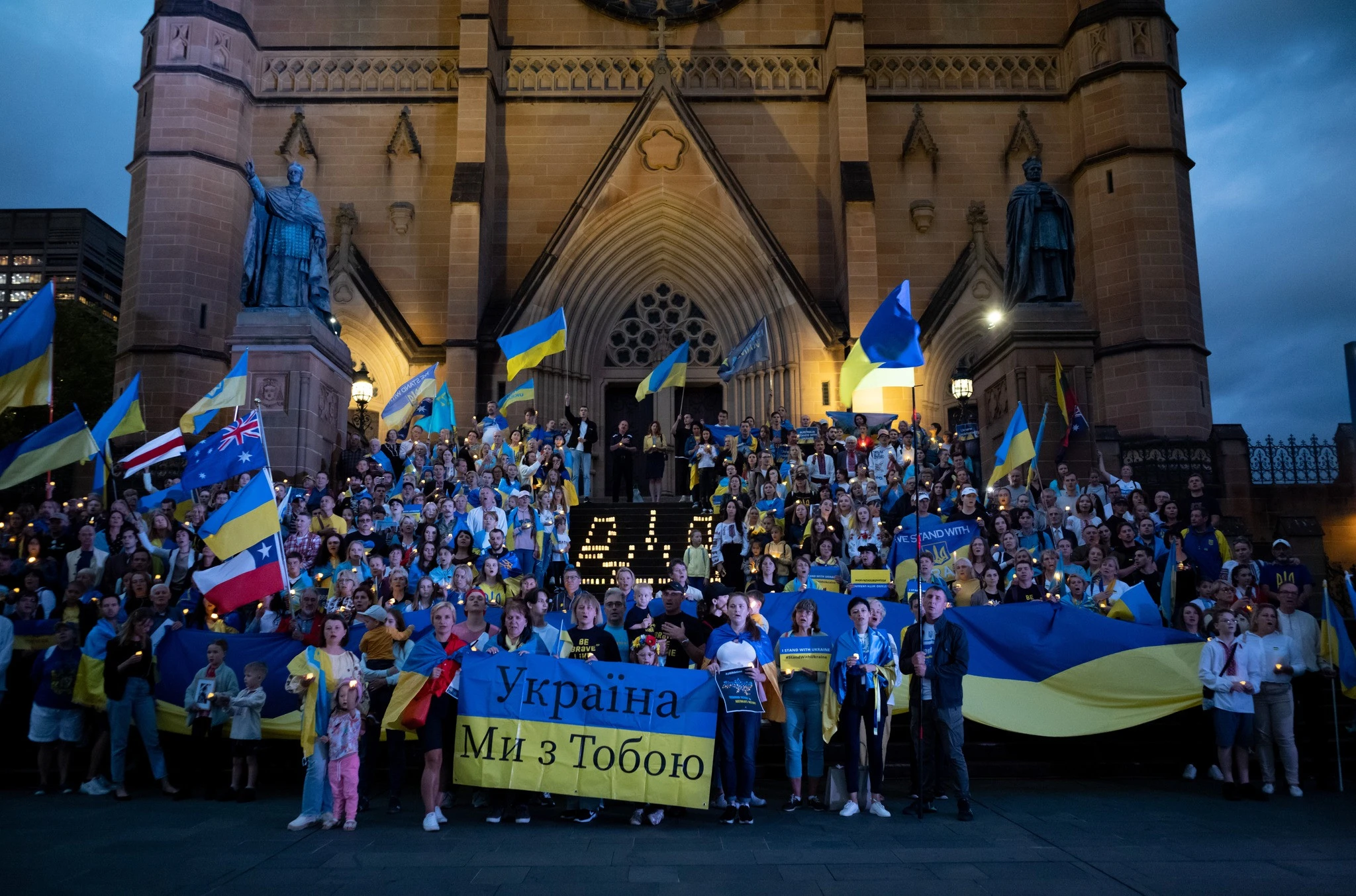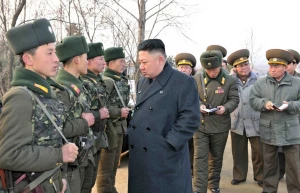
Support for Ukraine drops when war fades from news — Anton Bogdanovych, Ukrainian community leader in Sydney
How the relatively small Ukrainian community in Australia manages to persuade the government to provide military aid to Ukraine, how Ukrainians who moved to the continent after the full-scale invasion shock the diaspora, and why organizing regular actions in support of Ukraine worldwide is crucial
In July 2024, Australia announced a record $250 million military aid package for Ukraine, followed by the October announcement that the country would provide 49 M1A1 Abrams tanks to the Ukrainian Armed Forces. The Ukrainian diaspora played a significant role in securing this support, ensuring Australian society remains aware that Russia’s war against Ukraine continues. How do Ukrainians convince Australians to allocate funds to support a country on another continent and why is it crucial for diasporas worldwide to organize ongoing protests in support of Ukraine while the war persists? Anton Bogdanovych, the organizer of Ukrainian community protests in Sydney and a 20-year resident of Australia, discussed these questions in an interview with Espreso.
Mr. Bogdanovych, how large is the Ukrainian community in Australia?
The Ukrainian community in Australia, including both the established diaspora and recent arrivals, totals approximately 53,000 people. It is a relatively small community, as the journey to Australia is long and distant. Compared to other countries, Australia boasts a well-organized diaspora, with numerous organizations, schools, and churches despite its modest size. Those who wish to learn Ukrainian have ample opportunities to do so. Most people arrived during World War II. They established Ukrainian schools, Plast, SUM, built churches, and worked to preserve Ukrainian traditions, forming the backbone of today’s community. Many in the diaspora are second- or third-generation born in Australia, yet they still identify as Ukrainian and speak the language, albeit differently from recent arrivals. People like me represent the second wave of migration, coming primarily for work opportunities.

Photo by Nicholas Buenk
How does the old diaspora perceive the Ukrainians who are arriving in Australia now?
Compared to other countries, Australia has received fewer Ukrainians fleeing the full-scale invasion, so the percentage of these newcomers is relatively low. The biggest shocking factor for the older diaspora is the Russian language.
"Those who fled the war in 1939 carried with them an older form of Ukrainian. Even migrants like me were initially met with some caution because our Ukrainian language differs — we don’t use words like klyub, klyasa, or kopanyi myach (older or dialectal forms of Ukrainian words - ed.). They view their preserved language as "real Ukrainian." Now, new Ukrainians who speak Russian now arrive, the older diaspora, firstly, does not understand Russian because they never learned it. Secondly, they associate it with the enemy, which puts them off. However, the older diaspora has been more tolerant than I anticipated."
Churches often serve as the focal points of Ukrainian communities abroad. In Europe, following the full-scale invasion of Ukraine and the influx of migrants, churches affiliated with the Russian Orthodox Church have become more active. They provide humanitarian aid, organize community events, and invite people to their services. Some Ukrainian refugees are untroubled by the use of Russian in these church services. Is a similar trend occurring in Australia?
This issue does exist, though it is not widespread. However, several people have approached me about it. For instance, a girl once told me her father was being drawn first into the Russian Orthodox Church and then into Russian clubs. And it wasn’t a Russian woman influencing him but a Ukrainian woman, as though she had been tasked with recruiting more people. She would start by inviting someone to church, then to a Russian theater or club, and gradually to other activities.
But again, we cannot reach and communicate with all Ukrainians. We focus on engaging those who want to be part of the community. However, people who come here with pro-Russian views and are willing to join Russian clubs are not the ones standing with us at protests or participating in events supporting Ukraine.
How do you convince people that protesting in a foreign country can change something?
As an organizer of protests, one of the biggest challenges for me is motivating people to participate. I believe people need to see tangible results. At the start of the full-scale invasion, our focus was on raising awareness — sharing Ukraine’s story and ensuring the world didn’t forget us. It was crucial to shape the narrative within society. For the first few weeks, Australian media had no correspondents in Ukraine, relying entirely on information from us. However, as public attention began to wane, people started questioning the purpose of their efforts: Why am I standing here? That’s when we shifted our approach to focus on achieving concrete results. We began pressuring companies that had not yet exited the Russian market.
"For example, we protested three times a week for an hour in front of Canva, and within two weeks, we saw that the company had exited the Russian market. We stood in front of Atlassian longer — for three months, but over time, fewer and fewer people showed up. Then, we received the news that Atlassian had pulled out of Russia and donated $10 million to support Ukraine."
After that, attendance at the next protest surged because people saw the impact of their efforts. This kind of result motivates people — they realize that each person is a drop that contributes to the larger ocean.

Photo by Nicholas Buenk
For three years, we’ve protested every week, even when there’s no specific campaign. We have a core group of about a hundred people who no longer need to be reminded why we’re standing there—they understand the importance of it. For us, these protests have become a place of strength. It’s now as much a part of people’s routine as going to church. When others see that we don’t stop and that the protests continue, it motivates them to contribute in some way, even if it’s just by donating. From what I’ve seen in reports online, in a community of 53,000 Ukrainians, we raise more money for the Armed Forces than, for example, Poland, which has millions of Ukrainians. This is because such actions serve as a constant reminder that the war is ongoing and that something must be done.
We are now actively coordinating our efforts with international communities and sharing our experience. Together, we pressured the International Olympic Committee to ban Russian and Belarusian athletes from the 2024 Olympics. Before the New Year, we also collaborated with activists from other countries to push the German government on the Taurus missile issue. Now, we’ve resumed our protests after learning that Olaf Scholz is blocking a 3 billion euro military aid package for Ukraine. In Australia, our protests are held outside the German Consulate.
"It’s important to understand that when we protest near a consulate or embassy, the consul or ambassador is required to report the event to their Ministry of Foreign Affairs. If similar actions are organized in multiple countries, this generates a significant number of reports, which can influence political decisions and make their way into German news."
To what extent are Russian and pro-Russian organizations active in Australia, particularly in terms of influencing Australians and their attitudes towards Russia's war against Ukraine?
At the beginning of the war, pro-Russian groups tried to be very active and organize their rallies, but we countered these efforts in various ways. In general, Russians in Australia do not have much support. Some are apathetic, saying, "I am separate; politics are separate." Another group supports the war but is afraid to speak out, as they see that Australian society overwhelmingly supports Ukraine. There are also people on the payroll, who we discovered are paid by the Russian embassy, not just for participating in rallies but also on a monthly basis. These are full-time employees who pose as civic activists, writing blogs and spreading news on Telegram channels. And so they saw that the traditional rallies in support of Russia did not work here. On the contrary, many local Russians who are against the war came out to protest with us. In response, Russian “activists” shifted tactics, as they do globally: they began seeking out marginalized groups and joining them.
In Australia, the Russians initially aligned themselves with anti-vaxxers, even though the COVID pandemic had ended and it was unclear what they hoped to achieve. At first, they joined these protests, adopting the anti-vaxxer slogans. Gradually, they began to win over the movement's leaders by providing free water, grilling hot dogs, and handing them out to protesters. Over time, they gained the leaders' trust and worked their way to the top of the movement. Initially, the Russians pushed the narrative that "COVID was created in American biolabs." But as time went on, this narrative shifted to claim "COVID was created in Ukrainian biolabs." A few months later, these "freedom rallies” were being organized by Russians under Russian flags outside the Russian consulate.
We saw these changes unfold in real-time. Here's how it happened. At the start of the full-scale war, we would organize a protest, setting a specific time. We would arrive, only to find that the anti-vaxxers were already across the street, with thousands of them present. Then, one by one, they all would make their way to the square where we were supposed to hold our protest. We went to the police to ask for guidance, since we had an officially announced protest. The police responded that they couldn't disperse thousands of people with only a few officers — they didn’t have the resources. I went to small groups within the crowd and explained that we had a planned protest here and that we had no issue with them. I said if they supported Ukraine they could stay but we should avoid provocations that could make it to the news. Many of them agreed, saying, “Yes, we are for freedom, and you are too. We support you.” But such incidents would keep happening, and over time, these people became increasingly anti-Ukrainian. At the same time, the number of police officers grew, and they directed the protests in a way that kept our groups separated.
Now, the Russians are using the same tactics with pro-Palestinian protests — it's exactly the same strategy.
How does the relatively small Ukrainian community manage to convince the Australian government and the public to not only express support for Ukraine but also allocate funds for assistance, including military aid? After all, an Australian might ask, why should I care about a war on another continent?
It largely depends on how frequently the war in Ukraine is discussed in the media and how it is framed. In the early days of the full-scale invasion, the war was covered extensively in the news, but then attention shifted to Palestine, and Ukraine was scarcely mentioned for several months. As a result, support for Ukraine dropped significantly. However, when information surfaced about the helicopters (Australia had decommissioned MRH-90 Taipan helicopters, while the Ukrainian community lobbied for their transfer to Ukraine - ed.), media coverage spiked with over a hundred mentions. Following this, public support for Ukraine grew again.
Our community works effectively with traditional media, but it's important to note that Russians are much more proficient on social media. They have been actively promoting narratives like "our money is going to Ukraine" and "if Ukraine is given more weapons, the war will never end."
We explain to Australians that the war in Ukraine is a battle for the global order. If Ukraine falls, Europe will be next. China is closely watching the situation and has already declared that Taiwan historically belongs to it, which directly affects our region.
"Australia finds itself in a precarious security position — it is not in NATO, lacks nuclear weapons, and its military consists of only 28,000 soldiers. The primary defense mechanism is AUKUS, the alliance between Australia, the UK, and the US. However, after Trump’s victory in the US election, it is uncertain whether this alliance can be fully trusted. Trump has already made threats to invade Canada, Greenland, and Panama. And if he says: Australia, I'm coming for you, who will protect you?"
We are trying to convey that Ukraine is now fighting for international law, as it is the only safeguard that can protect a small country from invasion. If we abandon international law, which governs relations between nations, and shift to the law of the strong, then the outcome is clear: either you are strong and well, or you are weak and will be consumed. In military terms, Australia is much weaker compared to its larger neighbours. However, because this war is geographically distant, it is not felt as acutely here as it is, for example, in Lithuania. In general, many Australians view the war in Ukraine with the same detachment that Ukrainians once felt toward the war in Syria, showing little interest. Many Australians believe that the war in Ukraine is far removed from them and does not directly affect their lives.

Photo by Nicholas Buenk
To what extent are Russian businesses and companies with Russian capital present in Australia?
Speaking specifically about the Russian capital, there is not much we know of it here. There was one company with Russian capital, Tigers Realm Coal, which mined Russian coal, but it was stopped by sanctions. As for the Australian companies that were operating in Russia, we gradually phased them out. We started with the IT sector: Canva, Atlassian, and Freelancer. Now, we are not aware of any Australian companies still operating in Russia.
At the beginning, we also faced challenges with Russian products in supermarkets. When these products appeared, we reached out to the store managers, and in some cases, community members met with the management of individual stores. As a result, most of these products were removed from sale. It wasn’t even a government-level ban; rather, the supermarkets were receptive to our concerns. Even in the Russian store, which has now been renamed European, most of the products are from Ukraine. There are still some Russian items there, but we decided not to focus on them, as their share is small and doesn't have a significant impact. We had more pressing goals, like Atlassian and Canva, so we chose to focus our limited resources on those.
How does the Ukrainian community communicate with the Australian authorities? Does it have a representative in the Parliament?
We have our own organizations, such as the Australian Federation of Ukrainian Organizations, which represent the community at this level. They are in constant contact with politicians, explaining Ukraine's position to them. That is, the embassy and the community communicate with politicians, and I am not directly involved in this — I am engaged in protests and other activities.
Unfortunately, we do not have a representative in Parliament at the moment. We were initially convinced that we could join one party, but then the other party would win the election and potentially turn away from us, so we abandoned that idea. Perhaps we gave up too soon. However, there is a Ukraine Friendship Group, consisting of politicians who are not Ukrainian but are very supportive of Ukraine. Representatives from our organizations maintain regular communication with them, and they actively participate in events hosted by the Ukrainian community. All of this is incredibly important.
- News













































